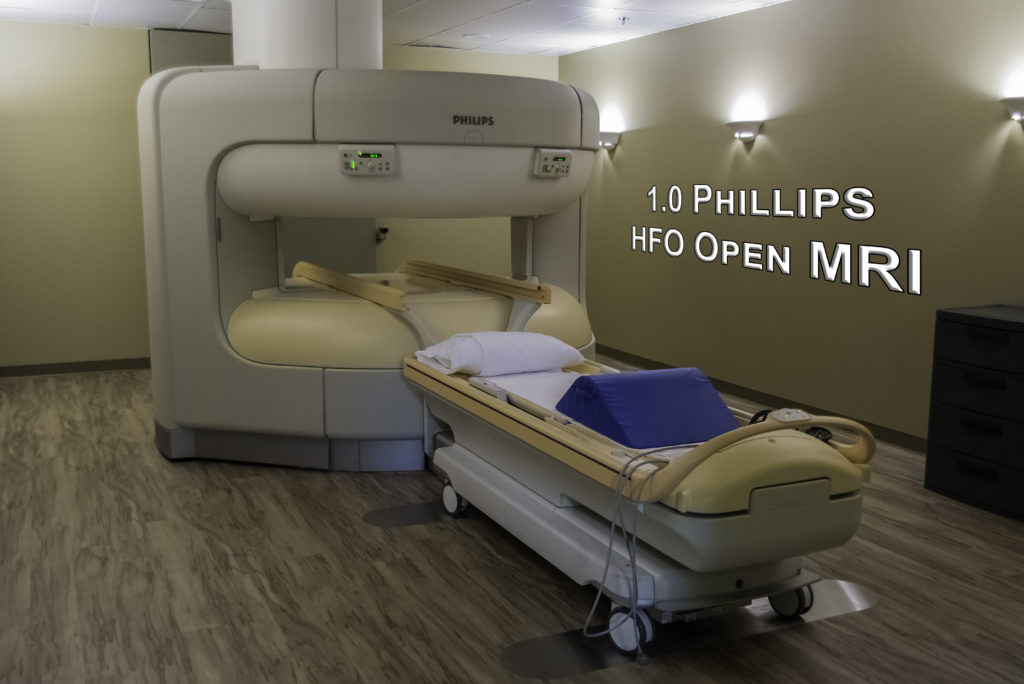
Open Magnetic Resonance Imaging or Open MRI, provides an extraordinary look inside the human body. Unlike other techniques, MRI uses no x-rays or radiation, but rather combines the naturally occurring force of a magnetic field with radio waves to produce signals that are reconstructed on a digital computer.
combines the naturally occurring force of a magnetic field with radio waves to produce signals that are reconstructed on a digital computer.
Our machines provides a 360 degree panoramic viewing angle with a 160 cm wide patient aperture to provide patients with a comfortable and relaxing exam.
An open MRI machine has a larger opening compared to a standard MRI machine. Some have magnets that do not completely surround your body, as shown here. But this kind of open MRI cannot do some types of MRI scans.
People who get nervous in small places (claustrophobic) may feel better using an open MRI machine. An open MRI machine also may be easier to use for people who are very overweight or obese. They can be accommodated with an integrated body coil. This wide open design on this system allows for a parent to lie next to their child during an exam.
MRI generates highly detailed, cross-sectional images of soft-tissue structures near and around bones, blood vessels, organs and the brain. This unique technology has given us a remarkable window to the internal structure of the body and has become an invaluable diagnostic tool replacing many more invasive surgical procedures.
Open Magnetic Resonance Imaging (MRI)
It is widely used to diagnose sports-related injuries, such as strains and tears of the ligaments, tendons and muscles. It can also be used to evaluate heart conditions and nervous system disorders.
The following are the various types of available MRI exams:
- Abdominal and Pelvis MRI helps to evaluate problems (e.g. tumors) in organs such as the liver, bladder, gallbladder, pancreas, and kidneys. It can also be used to evaluate abdominal blood vessels and infections, as well as a woman’s uterus and a man’s prostate.
- Head MRI is used to detect a variety of central nervous system disorders, including tumors, stroke, inflammatory and infectious conditions and vascular abnormalities, such as aneurysm. It can also reveal abnormalities of the eyes and optic nerves, and the ears and auditory nerves.
- Chest MRI allows visualization of the heart, valves and coronary blood vessels and can detect damage in the heart or lungs.
- MRA (magnetic resonance angiography) is used to see the blood vessels and the flow of blood. Problems with the arteries (i.e. an aneurysm) and veins (e.g. venous clots) can be identified, as well as blocked vessels or torn lining of a blood vessel.
- Musculoskeletal MRI can check for problems of the bones, joints and muscles, such as tumors, arthritis, bone marrow and cartilage abnormalities, torn ligaments and tendons and infection.
Patients do not feel any pain while undergoing an MRI and no special diet or preparation is required before this exam.
They are asked to remove anything metal, which includes jewelry and even bras, which typically have metal clasps, and may be asked to change into a hospital gown if their clothing has metal zippers or buttons.
Otherwise, wearing clothes should be fine. The examination table is fairly narrow and slides out from the tubular machine. It is very important that patients lie completely still during the procedure in order to obtain the clearest image.
Patients are easily able to communicate through an intercom; however, due to the enclosure of the equipment, some patients who experience claustrophobia may feel uncomfortable. MRI tests could take as little as 15 minutes or as long as two hours, depending on the type of study. Some examinations require an injection of a contrast agent into a vein to better view certain areas of the body.
Our radiologists help patients feel as comfortable as possible during their exam. We offer earplugs to all patients to minimize the volume of sound from the testing equipment. Immediately following the scan, patients may resume normal activities.
Because MRI uses magnets to create images, patients with pacemakers and some other implanted devices cannot undergo MRI. If you are going to have an MRI and you have an implanted device inside your body, please let the technologist or radiologist know prior to your study.
You may also wish to use our Online Appointment Request form for NON-URGENT appointment requests.
